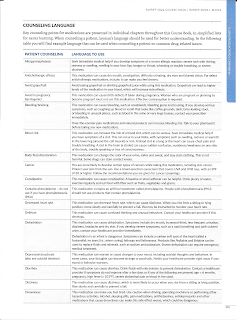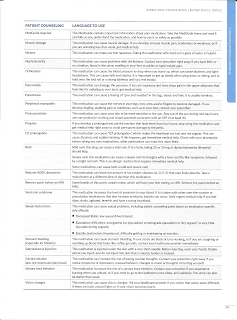Medication Counselling
Introduction
Pharmaceutical care has been defined as medication-related care provided through direct patient contact and intended to improve quality of life.
- One of the fundamental components will be patient education and counselling.
In United States, concerns regarding improper medication use led to mandates requiring pharmacists to provide patient counselling and education (e.g. The Joint Commission), professional association standards of practice (e.g. ASHP), and federal regulations (e.g. The Omnibus Budget Reconciliation Act of 1990 [OBRA-90]).
Ideally, medication counselling should extend to all patients and their caregivers regardless of the patient care setting.
- Collaboration with other healthcare professionals may help to individualize counselling.
- However, barriers do exist, such as excessive workload, lack of financial compensation and patient's attitudes.
At Malaysia, due to high patient load at government facilities, we tend to counsel only the essentials. Hopefully, this situation will improve soon.
- If possible, the follow-up of the patient that we have counselled earlier in outpatient setting should be emphasized too.
Garis Panduan Kaunseling Ubat-ubatan, 2019
Compared to the previous edition, there are more topics being covered in Garis Panduan Kaunseling Ubat-ubatan 2019, such as Respimat and Breezhaler.
- Nevertheless, counseling checklists represent the bare minimum of required information.
- Pharmacists should demonstrate initiative in pursuing further learning about each specific device.
- Furthermore, senior pharmacists can offer valuable insights into practical medication counseling challenges, including MDI hand coordination, distinct eye drop versus ointment application techniques, and other helpful tips.
Few possible updates in the coming edition shall include:
- The current edition mentions that once opened, the vial or insulin cartridge could be kept at room temperature and to be used within 28 days.
- However, if you look at the current product leaflet of Actrapid, Mixtard, Insulatard, Insugen-R, Insugen-N, Insugen 30/70, the insulins in-use shelf life is 6 weeks at temperature below 30˚C.
- In injecting insulin pen, there is still a lack of discussion on the need of pinching the skin with different pen needle lengths (4 mm, 5 mm and 6 mm).
- In applying eye ointment, the method of administration should include the critical step which spreads the ointment
- Blink your eye gently several times, then close your eye for 1 to 2 minutes; OR
- Gently close the eye and roll the eyeball in all directions. Try not to blink and do not rub.
- It does not discuss the current roles of inhaled corticosteroid in acute asthma exacerbation.
- The Respimat device has been updated to a reusable model, featuring a six-cartridge capacity.
Topical Preparations Counselling Guide for Pharmacist, 2018
Topical Preparations Counselling Guide for Pharmacist, 2018 is the first edition of its genre. It provides very relevant and handy counselling points to provide an effective counselling for topical preparations.
- However, I disagree with some of the contents.
On page 8, it is suggested that emulsion benzoyl benzoate (EBB) 12.5% & 25% should be avoided applying to head and face area.
- Australian Medicines Handbook and British National Formulary consider application should be extended to the scalp, neck, face, and ears (especially in children less than 2 years, elderly or immunocompromised people, people who have had treatment failure or those with atypical or crusted scabies).
On page 9, the mode of action of crotamiton 10% is described as a scabicidal agent.
- Apart from scabicidal activity, crotamiton also has antipruritic effects (anti-itching) mediated by inhibition of histamine, serotonin and PAR-2 (based largely on uncontrolled studies).
On page 11, gamma benzene hexachloride (GBH) 0.1% lotion is given as a treatment option for head lice.
- Lexicomp suggested to leave GBH 1% lotion on hair for 4 minutes and then rinse off (NOT GBH 0.1% lotion).
On page 24, regarding frequency of topical corticosteroids, there are many references which suggest at least up to 2 times daily for clobetasol propionate cream/ointment and betamethasone valerate cream/ointment full strength.
On page 25, I found the explanation given for fingertip units is bit confusing: 1 FTU steroid cream to be applied to skin lesion as large as 1 side of the hand.
- It is better explained with "one fingertip unit (approximately 500 mg) is generally enough to cover an area twice the size of a flat adult hand (with the fingers together)".
Counselling Approach
Counselling may be conducted via oral, written or technology-based communication (e.g. videotapes, audiotapes and interactive computer software).
- In general, the most effective method of communication is oral counselling combined with written instructions.
- Written instructions help reinforce oral counselling because the patient may forget or incorrectly remember oral instructions.
Generally, I usually will
- Start off with a self-introduction and followed by why I am here today.
- It can be confusing for patients to see many different healthcare professionals on the ward with little clue as to who is who and what they are all doing.
- Use open-ended questions to assess the patient's understanding of the medication therapy.
- What the doctors have already told him, or what he already knows?
- Patient should be informed on why it is important for them to be started on certain medications (e.g. what is the importance of sugar control).
- For device counselling (e.g. inhalers and insulin injections), I generally find it is easier to ask the patients to do at the same time as you are demonstrating it.
- This addresses the confusion on the spot and makes patients more confident with what they are being taught.
- Summarize information at the end of counselling session, emphasizing important key points.
- End the conversation with "Do you have any questions?".
- Plan follow-up with the patient, as necessary (if inpatient setting).
Always remind yourself, why are you tasked to give a patient counselling.
- It is not just to fulfil logbook or monthly key performance indicator requirements, but to teach and guide them.
- No point of rush through the whole process, it is best to reconfirm if patient is having any questions from time to time.
- At the end of the day, patients are on their own. To illustrate, managing diabetes or any other chronic diseases is not an easy task at first. They may have only very short (limited) consultation time with doctor (or even pharmacist) yet managing on their own for the rest of 3-6 months at home until the next appointment.
- Often, it is not about how much you already know, but how much information you have educated the patient.
NOTE: Some patients are allergic to the word "counselling", as patients might associate it with psychiatric patients who needs counselling or problematic students who need a counselling. So, it might be a good idea to say, he or she is going to teach you on how to inject insulin, instead of he or she is going to counsel you.
Counselling Tips
From experience, I have seen lots of fresh pharmacy graduate counsel point by point to the patients as what have written in the counselling guide.
- However, I believe explaining or teaching should be in your own words, and if possible, make it a two-way conversation.
- Strive to be organized in your flow of counselling, and essentially, practice makes perfect.
- Interactive counselling allows patients to provide feedbacks to you regarding actual or potential concerns and problems. Only then, you can assist the patient in developing solutions to actual or potential problems.
Also, if a patient new to inhalers continues to make common errors despite correction, it is beneficial to schedule a follow-up appointment.
- This allows them time to process the steps, rather than forcing immediate mastery.
- Counselling caregiver may be another practical approach.
If you are not fluent in Malay, please practice giving counselling in Malay, instead of just learning the counselling points in English.
- Regardless of the case, it is better to be prepared, rather than facing the tip-of-tongue in front of the patient.
Remember, when counselling a patient, layman's language should be used for better understanding. For example,
- Allergy/anaphylaxis = Seek immediate medical help if you develop symptoms of a severe allergic reaction such as severe rash with itching, swelling in your face, lips, tongue or throat, wheezing or trouble breathing.
- Anticholinergic effects = This medication can cause dry mouth, constipation, difficulty urinating, dry eyes and blurred vision.
- Constipation = This medication can cause constipation. A laxative or stool softener can be helpful. Drink plenty of water, exercise regularly and eat food with fiber such as fruits, vegetables and grains.
- Teratogenic = This medication can cause birth defects if taken during pregnancy. Hence, effective contraception is required.
- Many drug interactions = Check with your healthcare professionals before starting any new medications, including OTC medications and herbal products.
NOTE: Some patients may be tired or in pain, so they are not so willing to talk to you.
Reference
Some references on medication counselling points include
- Australian Medicines Handbook's counselling points
- AHFS Drug Information Essentials' Advice to Patients
- Australian Pharmaceutical Formulary and Handbook's clinical monographs counselling
- Davi's Drug Guide for Nurses' patient/family teaching
- Micromedex's Clinical Teaching
- Lexicomp's Alert: US Boxed Warning, Adverse Reactions (Significant): Considerations, and Patient Counseling Points
- MIMS's Patient Med Info
- The Top 100 Drugs by Elsevier
Summary
Medication counseling is often associated with newly started patients.
- However, it is important to realize that some existing patients may also need recounseling to improve poor device techniques (e.g., with insulin and inhalers) or to refresh their knowledge of their treatment.
- Some patients feel obligated to take medications as instructed but have a poor understanding of their medical condition and treatment plan.
External Links
- Garis Panduan Kaunseling Ubat-ubatan, 2019 PDF
- Garis Panduan Pelaksanaan Kaunseling Ubat-ubatan Secara Maya Virtual, 2021
- Topical Preparations Counselling Guide for Pharmacist, 2018 PDF
- Sarawak General Hospital Pharmacy - Counseling Points
- HKL Counseling Checklist
- HTAR Pharmacy Handbook
- e-IMBAS
- The least we could do, 2023
![The Omnibus Budget Reconciliation Act of 1990 [OBRA-90] The Omnibus Budget Reconciliation Act of 1990 [OBRA-90]](https://blogger.googleusercontent.com/img/b/R29vZ2xl/AVvXsEg13BWZW5O19T-HgGH4PTv159gdElB-QgjTBD5xQqdJlcVTqIxQSSTI1eyDahl6tECOMV7kxR0O8ujBGwIhIehGlZSqG7phaV2S0DdY1CghTDrujo2GPHj_yNiZWSXdU_16liFU0IG5bWKRKqnaQArpwtGPkYk5xYjZIt_4iI-vyX3klRlkAul2NT7m/w228-h320-rw/OBRA-90-Pharmacy-Provisions.png)







terima kasih ianya banyak membantu saya nak mulakan prp
ReplyDelete